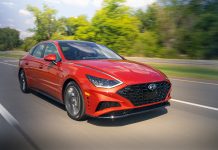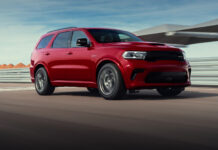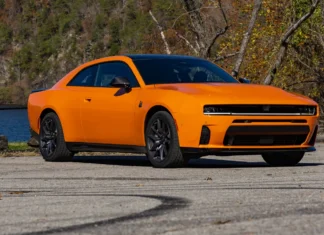
President Donald Trump is considering a plan to tag a 25% import tariff onto cars manufactured overseas.
One of the most popular cars in America, the Toyota RAV4, might get much more expensive soon. That is, if President Trump’s push to execute a 25% tariff on cars imported to the U.S. succeeds. On Wednesday, he ordered the U.S. Commerce Department to launch a probe into whether it could feasibly jack up tariffs on imported cars on the grounds of national security.
At the same time, negotiators are attempting to overhaul NAFTA’s rules as well regarding the flow of cars and automotive parts across the Canadian and Mexican border into the U.S. “Core industries such as automobiles and automotive parts are critical to our strength as a nation,” the president stated. Now, the probe could take several months to complete, according to a Politico article. When it’s over, they could recommend to the president whether to restrict imports by way of tariffs and exactly how to do it. Trump could then make a decision to raise tariffs or not.
There will be big news coming soon for our great American Autoworkers. After many decades of losing your jobs to other countries, you have waited long enough!
— Donald J. Trump (@realDonaldTrump) May 23, 2018
Roughly half of cars sold in the U.S. are American-built
According to a Wall Street Journal article citing the Center for Automotive Research, just over half of cars sold in the U.S. are built inside the country. In fact, 56% percent of cars sold here last year were also built in the U.S. Canada and Mexico each comprised 11% of the 17.3 million cars sold. That brings the total for countries bound by the NAFTA agreement to 78%, while the other 22% come from overseas.
Japan, for instance, accounts for 11% of cars sold in the U.S. in 2017. Germany and South Korea account for 4% each, while other nations make up the final 3%. If the Commerce Department makes the recommendation to President Trump to impose higher tariffs, it could have a seriously disruptive impact on the industry.
According to Wilbur Ross, Commerce Secretary, “There is evidence suggesting that, for decades, imports from abroad have eroded our domestic auto industry.” Foreign manufacturers like Toyota were alarmed at the proposed plan. Stock prices for several automakers, including Toyota, BMW, Daimler (Mercedes-Benz) and Volkswagen Group fell Thursday in light of the news.

What does this mean for you?
The move would impact our allies, as they rely on the U.S. market for a huge portion of their sales. European automakers exported $43 billion worth of cars to the U.S., while Japanese automakers exported $41 billion. Two of the most popular cars in America – the Toyota RAV4 and Nissan Rogue – are largely built outside the U.S. Toyota doesn’t manufacture the RAV4 at any of its U.S. plants. While Nissan does build some Rogues in Smyrna, Tennessee, the company imports over half the models it sells in the U.S. from Japan or South Korea.
If this tariff goes through, imported cars will inevitably get much more expensive. As it stands, we currently impose a 2.5% import tariff on cars from Europe and Japan. We don’t have any tariffs on cars from Mexico or Canada. That’s the reason why several car companies – like Volkswagen and Mazda – set up in Mexico. Manufacturers, industry spokespeople and analysts agree that the decision would lead to fewer choices and higher prices for American consumers.
“A general tax on imports would choke the U.S. auto economy,” according to Ferdinand Dudenhöffer, director of the Center for Automotive Research (CAR).























